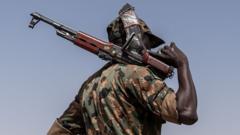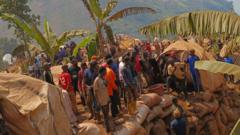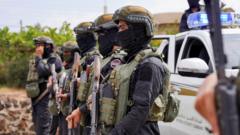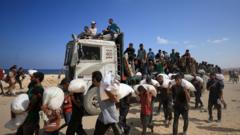As the conflict in Sudan continues to rage, Kordofan’s strategic significance for both military factions is drawing global attention amid rising civilian casualties.
Battle for Kordofan: A New Chapter in Sudan's Ongoing Conflict

Battle for Kordofan: A New Chapter in Sudan's Ongoing Conflict
Sudan's oil-rich Kordofan region becomes a pivotal battleground in the ongoing war between military and paramilitary forces, raising humanitarian concerns.
Sudan's Kordofan region, rich in oil and resources, has transformed into a critical battleground as the army confronts the Rapid Support Forces (RSF) in a bid for dominance. This escalation follows a series of devastating attacks that resulted in hundreds of civilian deaths, shocking the nation and the international community alike.
Experts, like Amir Amin from Oasis Policy Advisory, assert that whoever gains control of Kordofan will gain significant leverage over Sudan's oil supply, further complicating the already dire humanitarian crisis—12 million people displaced and approximately 150,000 lives lost since the conflict erupted in April 2023. The region, encompassing three states and a population nearing eight million, also serves as a crucial conduit for South Sudan's oil exports.
The confrontation intensified substantially since June, following a period when the RSF had made notable territorial gains. Sudan's military leader, Gen Abdel Fattah al-Burhan, recently returned to Khartoum to rally his troops after a brutal campaign against the RSF in the capital. However, much of Khartoum lies in ruins, serving as a stark reminder of the conflict's toll.
As the army seeks to recapture Kordofan, analysts predict a strategic shift towards the west and into Darfur, the birth region of the RSF. Meanwhile, the RSF is focused on maintaining its foothold in Kordofan, which they view as vital for regaining influence over central Sudan, with potential aspirations to retake Khartoum.
Tensions have escalated, with the RSF threatening retaliation against airstrikes in West Kordofan. Reports indicate that bombings targeting areas such as el-Fula and Abu Zabad, which included civilian shelters, have led to significant outcry from humanitarian organizations like the UN. They condemned the attacks, labeling the violence as a blatant breach of international humanitarian law—harmful to vulnerable civilian populations.
Amid deadly confrontations and accusations of war crimes from both sides, the situation remains precarious. The Yale Humanitarian Research Lab has documented signs of intentional targeting of civilian areas, amplifying global concerns over the escalating violence and humanitarian disaster.
The battleground continues to shift throughout Kordofan, with critical locations such as Umm Sumaima changing hands repeatedly. Control of this area could either enable the RSF to encircle the military or allow the Sudan Armed Forces to establish new supply lines.
With important strategic implications on the line, the stakes in Kordofan are perilously high, suggesting that while victory may still remain uncertain, the outcome of this conflict may redefine the future of Sudan.
Experts, like Amir Amin from Oasis Policy Advisory, assert that whoever gains control of Kordofan will gain significant leverage over Sudan's oil supply, further complicating the already dire humanitarian crisis—12 million people displaced and approximately 150,000 lives lost since the conflict erupted in April 2023. The region, encompassing three states and a population nearing eight million, also serves as a crucial conduit for South Sudan's oil exports.
The confrontation intensified substantially since June, following a period when the RSF had made notable territorial gains. Sudan's military leader, Gen Abdel Fattah al-Burhan, recently returned to Khartoum to rally his troops after a brutal campaign against the RSF in the capital. However, much of Khartoum lies in ruins, serving as a stark reminder of the conflict's toll.
As the army seeks to recapture Kordofan, analysts predict a strategic shift towards the west and into Darfur, the birth region of the RSF. Meanwhile, the RSF is focused on maintaining its foothold in Kordofan, which they view as vital for regaining influence over central Sudan, with potential aspirations to retake Khartoum.
Tensions have escalated, with the RSF threatening retaliation against airstrikes in West Kordofan. Reports indicate that bombings targeting areas such as el-Fula and Abu Zabad, which included civilian shelters, have led to significant outcry from humanitarian organizations like the UN. They condemned the attacks, labeling the violence as a blatant breach of international humanitarian law—harmful to vulnerable civilian populations.
Amid deadly confrontations and accusations of war crimes from both sides, the situation remains precarious. The Yale Humanitarian Research Lab has documented signs of intentional targeting of civilian areas, amplifying global concerns over the escalating violence and humanitarian disaster.
The battleground continues to shift throughout Kordofan, with critical locations such as Umm Sumaima changing hands repeatedly. Control of this area could either enable the RSF to encircle the military or allow the Sudan Armed Forces to establish new supply lines.
With important strategic implications on the line, the stakes in Kordofan are perilously high, suggesting that while victory may still remain uncertain, the outcome of this conflict may redefine the future of Sudan.





















